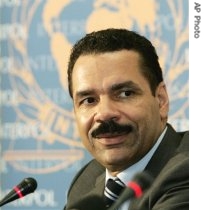-
(单词翻译:双击或拖选)
Washington
12 July 2007
The secretary-general of Interpol, the international police organization, says countries need to share data on lost or stolen passports. In a VOA interview, the Interpol chief says the failure of countries to pool such information makes it easier for terrorists to travel across borders. VOA correspondent Gary Thomas has this report.
 |
| Ron Noble |
"In my view, every country in the world should make it their highest priority to scan passports of visitors against Interpol's global database. But my point is, right now, as I speak to you, only 17 countries in the entire world are doing this. Seventeen," he stressed.
To underscore his concern, he says that in 2007, France made 727,000 passport checks of the Interpol database. In that same period, he says, the United States searched the Interpol passport database 500 times, and Britain 300 times. However, he adds, Britain and the United States are due to hook up to the database within the next several months to scan all visitors' passports.
Noble says governments have made great strides in anti-terrorism measures, particularly in Britain and the United States. But he says nations should also collectively follow up when a match is made on a missing passport, which now happens, he says, about 2,000 times a month.
"But the problem that the world needs to recognize is that unless there is an international, multilingual task force that is established whose principal responsibility is to follow up on all the hits of peoples' names and passports that have come across borders around the world, we're going to allow these terrorists to travel more freely when they shouldn't," he said. "So what I'm suggesting and what I'm imploring3 is that what countries are doing at the national level, they've got to do at the global level."
Noble says he finds it particularly alarming that Britain has not shared information about its investigation4 of the recent thwarted5 terrorist plots there with Interpol.
"To this date, the U.K. has not shared a name, a phone number, a fingerprint6, or an address in connection with that terrorist investigation," he said. "And in my view, in the 21st century, in the century in which we find ourselves following the September 11th attacks, the world needs to change the way in which it fights terrorism globally by sharing information instantly and immediately with countries around the world. That's not happening, and it needs to happen."
He says passports can be quickly checked with both national and Interpol databases at the port of entry with no inconvenience to travelers at immigration control.
"It is done simultaneously7 so that the typical response time from the Interpol system is two to four seconds, which at times is much faster than the response time that countries get from their own national systems. So it will not lead to any longer lines," Noble said.
Interpol has no law enforcement powers. However, it acts as an international clearinghouse for countries' police forces to exchange information, and maintains other databases on stolen vehicles and art works. Noble, an American who has been Interpol secretary-general since 2000, says there is also a need for a centralized database of convicted terrorists.
 收听单词发音
收听单词发音
1
fully

|
|
| adv.完全地,全部地,彻底地;充分地 | |
参考例句: |
|
|
|
2
automated

|
|
| a.自动化的 | |
参考例句: |
|
|
|
3
imploring

|
|
| 恳求的,哀求的 | |
参考例句: |
|
|
|
4
investigation

|
|
| n.调查,调查研究 | |
参考例句: |
|
|
|
5
thwarted

|
|
| 阻挠( thwart的过去式和过去分词 ); 使受挫折; 挫败; 横过 | |
参考例句: |
|
|
|
6
fingerprint

|
|
| n.指纹;vt.取...的指纹 | |
参考例句: |
|
|
|
7
simultaneously

|
|
| adv.同时发生地,同时进行地 | |
参考例句: |
|
|
|















